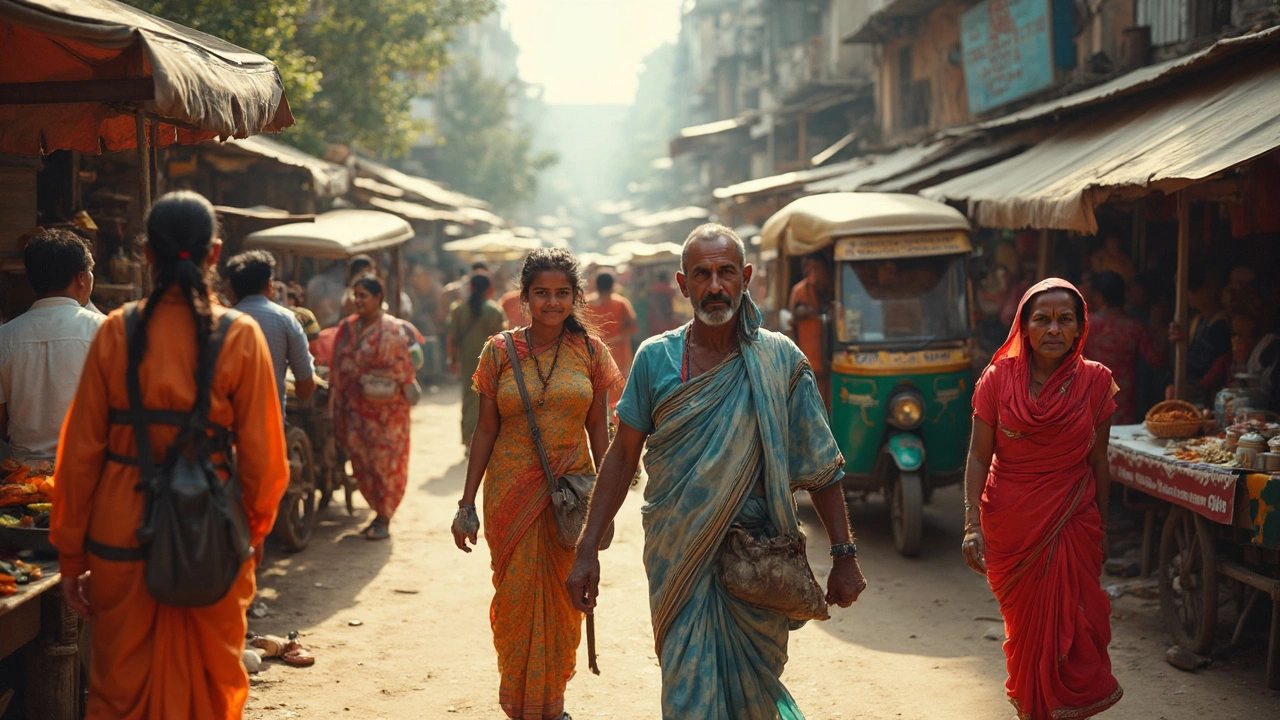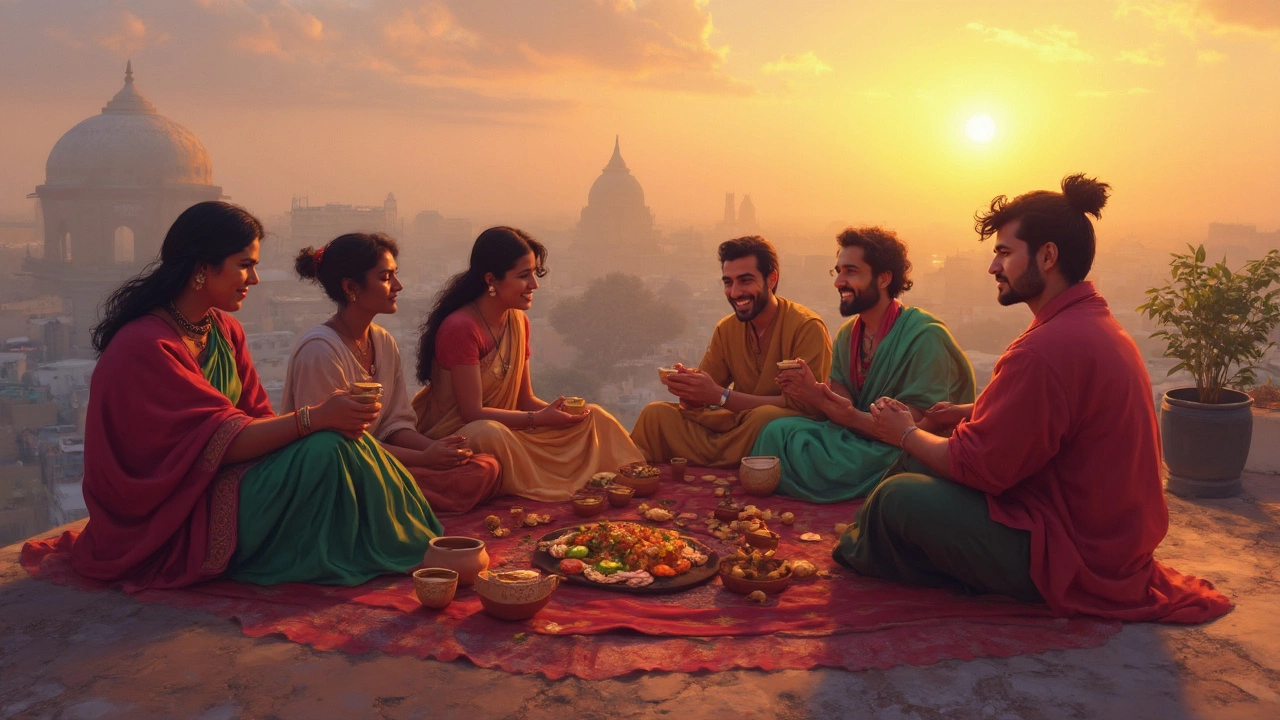
Ever wondered why millions of travelers get hooked on India—not just for the food or palaces, but something deeper? Real talk: it’s the way Indians live and think. The best quotes you hear in India aren’t from textbooks or movies. They’re from cab drivers, aunties, chai vendors—regular people. In India, advice comes free and from everyone.
What makes these quotes special? They’re honest, sometimes funny, often blunt, and always useful. You might hear, “Don’t count your troubles, count your blessings,” when you’re stuck in traffic. It’s not just small talk, it’s a survival tool, a way of saying, ‘Yes, life is messy, but there’s power in how you deal with it.’ These everyday nuggets shape how people handle challenge and chaos—skills you can actually use, wherever you are.
- Everyday Indian Wisdom: Quotes that Guide Life
- The Power of Connection: Family, Friends, and Strangers
- Surviving and Thriving: India’s Practical Life Hacks
- Why India’s Spirit Feels So Unstoppable
Everyday Indian Wisdom: Quotes that Guide Life
Step into any street market, school, or living room in India and you’ll catch lines that hit harder than any motivational poster. These short, punchy life quotes are everywhere—and people actually use them to solve problems, manage stress, and even crack jokes during tough times.
For example, “Sab kuch milega, thoda sabr toh rakho” means “You’ll get everything, just have a little patience.” Sounds simple, right? But ask anyone fighting a long bank queue or waiting for a late train, and they’ll tell you this saying keeps them calm. This is real-life advice that matters when everyday hassles try to wear you down.
Some of these quotes go way back, getting passed from grandparents to kids. "Atithi Devo Bhava," or "The guest is God," isn't just a phrase. It shapes hospitality in Indian homes every day—don’t be surprised if you’re handed a chai or meal even if you turn up unannounced.
Another crowd favorite: "Jugaad se kaam chala lo," or "Figure it out with a little bit of improvisation." This captures the Indian style of getting things done when resources are low. It’s basically the national hack. You’ll see people fix bikes with bottle caps or repurpose plastic bottles for planters—all inspired by that one quote.
| Popular Quote | Translation | Where You'll Hear It |
|---|---|---|
| "Apna time aayega" | "My time will come" | Movies, College Campuses |
| "Karma boomerang hai" | "What goes around comes around" | Family Gatherings |
| "Jo hota hai acche ke liye hota hai" | "Everything happens for the best" | Everywhere, especially after a setback |
| "Bindaas reh!" | "Just chill!" | Among Friends, Parties |
What’s cool is how these life quotes from India pack real power. They help folks accept bad luck, push through with hope, or tackle messes with a grin. If you ever feel stuck, try using one—it’s surprising how much better things feel when you see them through this no-nonsense lens.
The Power of Connection: Family, Friends, and Strangers
In India, it’s pretty common to see three generations living under the same roof. Parents, kids, and grandparents all pitching in, sharing meals, and yes, sometimes arguing about cricket. This daily togetherness does more than just keep families close—it builds support you can actually count on, whether someone’s sick or just in need of a pep talk.
It’s not just family though. Friendships here run deep. Back in 2018, a Pew Research Center survey showed that 90% of Indians have close friends they trust with life advice. People grow up with the whole neighborhood looking out for them. Your school teacher drops in for tea, your neighbor brings over food during festivals, and even the local grocer knows your cousin’s wedding anniversary. These connections wrap around you like a safety net.
And strangers? Indians will invite you in for chai even if you just met. There’s actual data to back this up: a 2021 survey by Ipsos found that 74% of Indian adults had helped a stranger in the past month—the highest in the world at the time. The welcoming vibe isn’t just a myth; it happens every single day.
“In India, the family ties are so strong that even friends and neighbors become family. This extended support system is something rarely found elsewhere.” – Dr. Radhika Chopra, sociologist
What does all this mean if you’re visiting or living in India? Simple: don’t be shy. Step into conversations. Ask for help. Celebrate festivals with new friends. You’ll soon realize that in India, personal connections are the real secret sauce. They’ll get you through traffic jams, tough days, and, most importantly, make you feel at home—no matter where you’re from.

Surviving and Thriving: India’s Practical Life Hacks
If you’ve ever wondered how people get by in a country as wild and unpredictable as India, it all comes down to practical know-how and a few key life hacks. The idea of surviving and thriving is right at the core of daily life—it’s about working smarter, not just harder.
First, let’s talk about the famous Indian jugaad. This word basically means fixing problems on the fly, MacGyver style. From repairing a broken scooter with string to turning a steel drum into a water tank, there’s always a way to make things work. Jugaad is so much a part of Indian life that even big companies now look for this skill when hiring—Indians don’t just solve problems, they find new ways around them.
Public transport is an adventure of its own. Don’t be surprised if you see hundreds of people managing to squeeze onto a train meant for fifty. If you ever find yourself in a packed Mumbai local, watch the pros: backpacks in front, elbows tucked, and always keep an eye for the exit. It’s a lesson in space management the rest of the world could use.
Home-cooked food is another practical hack. Indians often cook once and eat twice, turning leftovers into totally new dishes the next day. That’s why a curry from yesterday becomes a stuffing for parathas or a sandwich filling. It keeps food waste low and meals interesting.
Electricity cuts? No one panics. Candles come out, phones run on power banks, and families gather for conversation or card games. Power outages aren’t rare in some states, but people are ready—often with a backup inverter.
Staying healthy in the daily hustle is also a part of Indian life. You’ll see people sipping masala chai or tulsi tea, both believed to support immunity. And don’t forget about the Indian habit of carrying water bottles—hot, filtered water is a simple, cheap way to stay safe.
- Carry cash and small change: Many shops, especially in markets, still prefer cash over cards.
- Negotiate everything: Haggling is a skill. If you pay the first price in a busy Indian bazaar, you’re probably paying double.
- Plan for crowds: Whether it’s in temples, markets, or on the roads, things move differently here. A little patience goes a long way.
Here’s a look at how these life hacks measure up in daily Indian life:
| Practical Hack | Common Use |
|---|---|
| Jugaad (Quick Fix) | Repairs, daily workarounds |
| Cash Transactions | Street food, markets |
| Leftover Makeovers | Reducing waste, saving time |
| Power Backup | Home inverters, power banks |
Living in India isn’t just about getting by; it’s about picking up little skills that make you sharper, more adaptable, and kind of unbeatable in everyday situations. These tricks aren’t just good here—they work anywhere life gets a bit unpredictable.
Why India’s Spirit Feels So Unstoppable
It doesn’t matter where you go in India—busy markets, rural villages, giant tech offices—you’ll notice something common: people bounce back, no matter what. India faces challenges most countries don’t deal with daily: heavy traffic, power cuts, crazy weather swings, and a population that’s over 1.4 billion. But the energy on the ground? Still buzzing. It comes from a mindset that treats problems like puzzles, not roadblocks. That’s why the world looks at India with so much curiosity.
Resilience here is almost contagious. The way local businesses restart after monsoon floods or how students adapt to online classes during power outages—they just find a way. During the pandemic, for example, India ran the world’s biggest free food programs. Nearly 800 million people got rations, proving it’s not always about resources—it’s about attitude and hustle.
What’s the secret sauce? Here are a few things that drive this unstoppable spirit:
- Family and Community Bonds: Everything runs on connections. If your phone breaks, neighbors help. If you lose your way, strangers will guide you. People stand together, not alone.
- Jugaad: This everyday word means hack or quick-fix, and it drives so much creativity. From making a working fan out of scrap to sharing a single internet connection in a village, Indians are pros at making things work, no matter what.
- Hope and Humor: You’ll see people crack jokes about everyday struggles. Watch an Indian comedy or just listen at a tea stall. Laughter really is a survival skill here.
If you look at some hard numbers, India’s young generation is another reason for its energy. Almost 50% of Indians are under age 25. That’s a lot of people bursting with new ideas. Tech startups, digital payments, new online schools—these are all led by young Indians who aren’t afraid to try, mess up, and try again.
| Aspect | India |
|---|---|
| Population under 25 | ~50% |
| Entrepreneurs (2024) | Over 80,000 registered startups |
| Daily meals distributed in COVID-19 | 800 million+ |
What’s really special isn’t just the struggle—it’s the no-quit attitude. And that’s why life in India is full of stories you don’t see anywhere else.